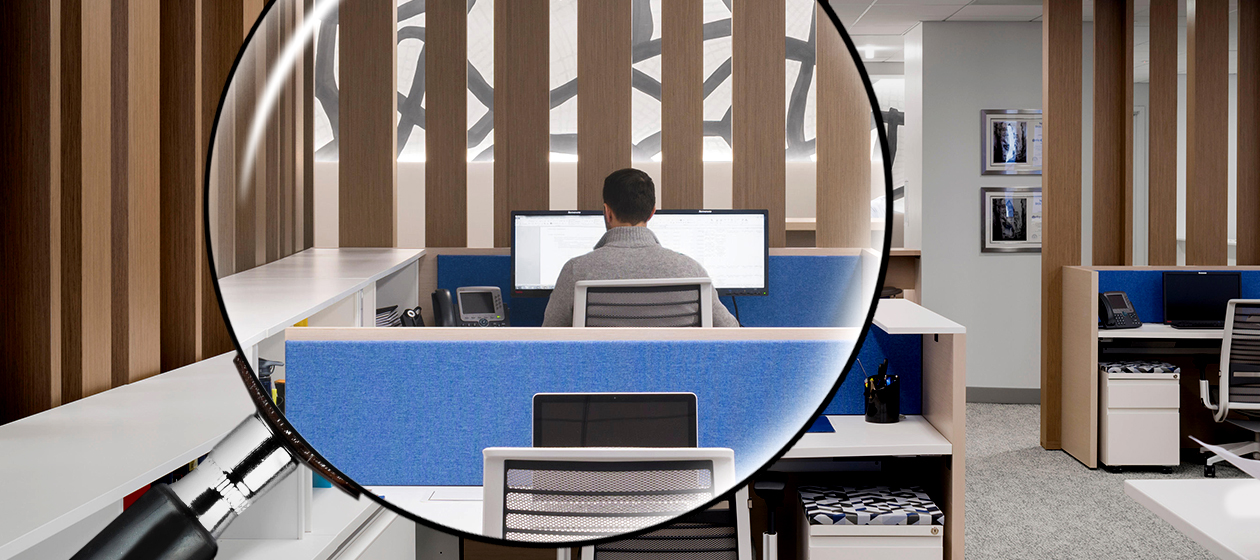The high-tech office of the future will spy on you
They'll read your emails, listen to your conversations, and watch your every move


A free daily email with the biggest news stories of the day – and the best features from TheWeek.com
You are now subscribed
Your newsletter sign-up was successful
Imagine a future in which your boss tracks how often you email management, how often you talk face-to-face to your coworkers, how long it takes you to perform tasks, and even how often you get up to walk around the office.
Well, that future is now.
What's effectively spying on workers is on the rise, as new office surveillance technologies are becoming ever more convenient and accessible. An increasing number of businesses are adding sensors to offices in lights, under desks, and on walls to track employees. Some gather data from employees' computer and key swipes to understand how the business operates.
The Week
Escape your echo chamber. Get the facts behind the news, plus analysis from multiple perspectives.

Sign up for The Week's Free Newsletters
From our morning news briefing to a weekly Good News Newsletter, get the best of The Week delivered directly to your inbox.
From our morning news briefing to a weekly Good News Newsletter, get the best of The Week delivered directly to your inbox.
Some new companies use machine learning techniques to collect data. For example, Humanyze, a company born out of the MIT Media Lab, helps companies measure corporate communication data. This can help answer questions like "How many hours do people actually work?" or "How does management interact with the engineering teams?"
What humans report can be different from what's actually practiced, but AI-collected data can provide the clear-cut truth by sifting through employees' emails and chats to collect data on how work is done.
"It's really showing how people are collaborating today and showing how that changes over time to predict the impact of our management changes," said Ben Waber, CEO of Humanyze. "What we're able to do is rapidly understand what's going on and test out what's going to happen."
These technologies can lead to big changes in how people work, with their lessons inspiring new training programs, workplace planning, and more. But they also inspire privacy concerns.
A free daily email with the biggest news stories of the day – and the best features from TheWeek.com
Waber emphasizes that Humanyze does not catalogue individual content from emails, just the metadata. That means Humanyze doesn't tattle to the bosses about what you wrote to your colleagues. Rather, it collects data on how employees interact over email and aggregates data on a team basis.
There are potentially positive benefits to this. Imagine, for instance, that a workforce has an even gender ratio, but email data shows that women are invited to meetings less often, or that managers communicate with women less. Humanyze can suss this out and tell the company it needs to make changes to be more inclusive.
In addition to email and chat data, Humanyze can capture data on face-to-face interactions with people. To do this, they built sensors with microphones and bluetooth accelerometers to put in employee badges. Humanyze insists that this data, too, is aggregated into one big pool, so that bosses don't learn what specific people say to each other, but rather get broad conclusions about how much people speak, who talks to who, and how dominant people are in conversations.
This can all potentially increase performance and cut costs at a company, as the data can lead to changes that help people collaborate more efficiently. It could also potentially help workers, too. For example, if AI measures how you interact with others, it can provide suggestions based on the data, such as taking a public speaking course or suggesting online training programs for specific skills that would be beneficial for you.
There are benefits to consumers, too. Consider the case of surveillance systems at call centers, where these systems can cut down on wait time between calls, predict what kind of calls will come up, and which employee will best be able to handle the call.
"There are some solutions to make every single second of employees' time as efficient as possible, if surveillance is necessary to improve efficiency," said Winifred Poster, a sociologist at Washington University who has studied these systems. But while companies may be more efficient, she says, there may be more burnout among employees, as they actually spend more time working.
There are also, of course, ethical implications when it comes to data collection on employees. In her research, Poster has seen data-collecting trackers placed in call center workers' phones.
"As they're putting tracking on workers' phones and collecting data on what they're doing on their work lives as well as home lives, the surveillance has very significant ethical implications for employees," Poster said. Currently, there are no federal laws that expressly address employer surveillance or limit the intrusiveness of such surveillance.
In a paper called "Limitless Worker Surveillance," authored by law researchers Ifeoma Ajunwa, Kate Crawford, and Jason Schultz, it's proposed that America needs a "comprehensive omnibus federal information privacy law," similar to approaches taken by the European Union to protect people's personal data and require employers to inform their employees if they are monitoring emails. The authors also recommend a more specific Employee Privacy Protection Act that would focus on prohibiting surveillance practices that extend outside of work.
"As the data collection gets more and more extreme, in the overlap of the human being as a worker and the human being as a citizen, the line is getting more blurred on the data they're collecting," Poster said.
Humanyze's Waber agrees that the industry needs more regulation and emphasizes that if management wants to use AI monitoring in businesses, they need to be transparent with their employees, and employees should be able to opt out.
"People like their jobs more and companies make more money because of what we do," Waber said. "We need to push for regulation to keep out bad actors. There should be a societal agreement about what we should and shouldn't do with this kind of data."
Rosalie Chan is a Bay Area based writer and software engineer. Her work has appeared at TIME, Inverse, VICE, Teen Vogue, and more.
-
 Key Bangladesh election returns old guard to power
Key Bangladesh election returns old guard to powerSpeed Read The Bangladesh Nationalist Party claimed a decisive victory
-
 Judge blocks Hegseth from punishing Kelly over video
Judge blocks Hegseth from punishing Kelly over videoSpeed Read Defense Secretary Pete Hegseth pushed for the senator to be demoted over a video in which he reminds military officials they should refuse illegal orders
-
 Trump’s EPA kills legal basis for federal climate policy
Trump’s EPA kills legal basis for federal climate policySpeed Read The government’s authority to regulate several planet-warming pollutants has been repealed
